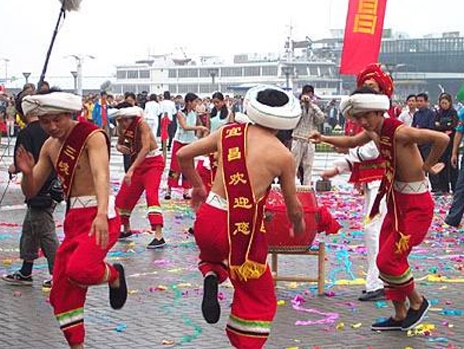
"Saye'erhe" of Changyang Tujia minority in Hubei is a kind of funeral dance popular among people of Tujia minority at the middle reach of Qingjiang Valley in Hubei. "Saye'erhe" means dance for the deceased or "dance following funeral drum tempo". When the elder dies, his coffin will be placed in the front of the mourning hall, and relatives and neighbors will come to express condolence. In the night, a mass of people will "beat the drum and sing the song" all night long to heighten the atmosphere, so as to eliminate the loneliness of the deceased and to comfort his family. The funeral dance is featured by dancing with hand and leg at the same side together. The steps are bold, stable and slow. Its lyrics focus on eulogizing the life of the dead and always sing praise of him for raising children and his contribution to work.
"Saye'erhe" is not only a simple and fascinating type of song and dance, but a sort of artistic custom or custom-based art as well. Meanwhile, it also carries rich historical and cultural information. It has three ancient characteristic melodies, which only exist in part of Xingshan area. Xingshan is located on the northern bank of the Yangtze Gorges of Yibei in Qingjiang County. As other styles of song die out, "Saye'erhe" remains original in dance for the deceased. According to documentary records, we can trace its origin to Tang dynasty at least. What's more, the book Ba-Yu Dance and Ba-People military dance in the war of Duke Wu defeating Emperor Zhou at the end of the Shang Dynasty can provide us some clues for its origin.
"Saye'erhe" is a traditional type of song and dance for sacrifice. The folks get together in front of the coffin of the deceased. Men sing and dance, and women dress in bright clothes to add the fun around. Generally, such activity tends to last all over the night. People of Tujia minority regard life and death as seasonal changes, it is natural. They think that the old man who dies after living happily through his entire life complies with the laws of nature and deserves celebration. If any elder passes away, they deem it as "going to the heaven", which is named "white happy event". Hence, in spite of the gender and status of the death, all of his fellow-villagers and neighbors will strike the drum for the death over night, and in this way to conform the living. People of Tujia minority express their broad-minded sense of life and death by this splendiferous song and dance.
